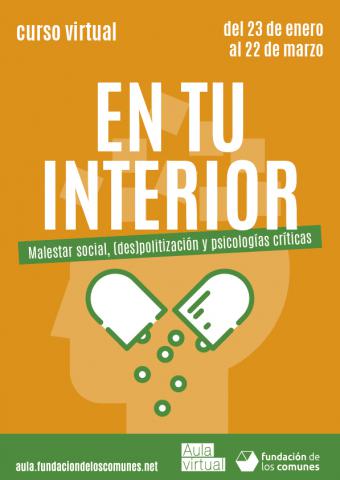Curso Aula Virtual
23 Enero al 22 Marzo, 2018
Aula virtual y presencial (Traficantes de Sueños) Nociones Comunes
Cuéntame cuál es tu problema. Algo te pasa, algo adentro que no funciona, que no se adapta y debe ser reparado. Necesitas cambiar tus actitudes, te falta motivación, te acomodas en tu zona de confort, no entrenas tus habilidades, no has adquirido suficientes competencias. Si sufres, elimina tus creencias irracionales. Si fracasas, levántate de nuevo una y otra vez. Si estás cansada, organiza tu tiempo racionalmente. Si no eres feliz, piensa en positivo. Si tienes miedo, sé valiente. Si quieres, puedes: la solución está en tu interior.
Se nos repite que nuestras sociedades han alcanzado altísimas cotas de desarrollo, pero en medio de tanto progreso, una extraña epidemia recorre el mundo. ¿Se trata de algún virus? Enfermedades sin origen biológico conocido que no dejan de expandirse y alrededor de las cuales se definen una infinidad de discursos e instituciones que empujan en una dirección: para los dolores individuales, soluciones individuales. Y entonces, ¿por qué cada vez somos más quienes nos enfermamos y vivimos esos malestares como si emergieran de nuestro interior? Hoy, la enfermedad ya no es algo anormal; hoy, el malestar es la nueva cuestión social. La irracional racionalidad del capital, elevada a único principio de realidad, exige sujetos en permanente adaptación al imperativo de competencia de todos contra todos. Esta dinámica cada vez más intensa y excluyente subordina todas aquellas formas de vida que no sirvan a tal fin, produciendo masas de población desajustadas de una supuesta normalidad cada vez más imposible de cumplir. Malestares comunes que, en su gestión política actual, son biologizados, psicologizados y medicalizados, remitiendo a los sujetos a encerrarse sobre sí y a entregarse a su voluntad de auto-ayudarse. Se nos arroja hacia una despolitización basada en la individualización de los malestares cotidianos. Se nos niega la posibilidad de imaginar un mundo en el que las diferencias no se patologicen ni se jerarquicen; un mundo en el que nuestros plurales sufrimientos puedan compartirse y aliviarse desde el reconocimiento de la diversidad y la autonomía de todas las formas de existir.
Seguir leyendo Malestar social, (des)politización y psicologías críticas

